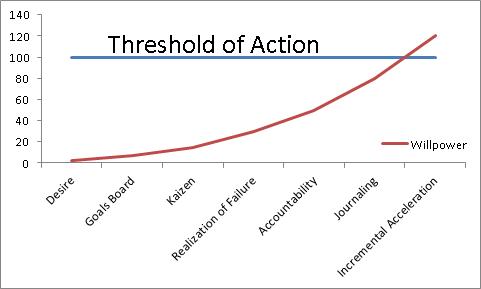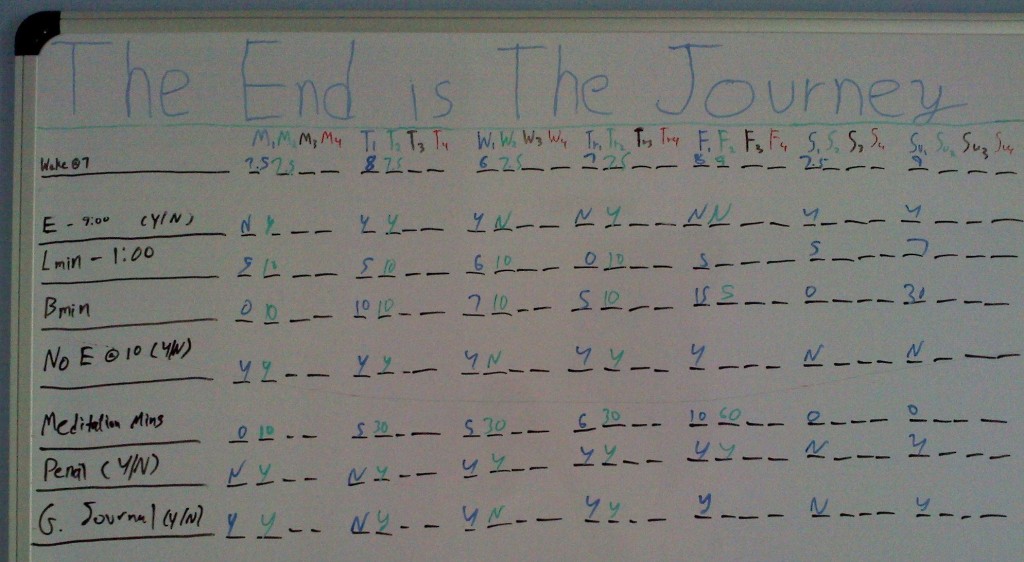In the past two weeks I've made a number of changes that I've been putting off for years. The biggest change is that I exercise my willpower to failure every day.
As I talked about yesterday, I didn't suddenly discover a willpower secret or lasting source of inspiration. Over the past three months, I have been accumulating a set of goal achievement techniques that were cumulatively bringing me closer to the Threshold of Action.
It took several triggers to sufficiently motivate me to quit my old job. Likewise, each goal achievement technique on its own did little. Combined, they made all the difference.
Desire
Without a desire to change, nothing will be different. It's that initial spark that motivates us to get a better job, get into shape, and pursue our dreams. Unfortunately, most of us never realize that a desire to change is only the beginning. Without a supporting system of accountability, gamification and reflection, even modest change can require herculean desire.
Five months ago, as I was learning about positive psychology, I realized that my current set of life goals and attitudes needed to be replaced if I wanted more happiness. My donuts needed to be replaced with bananas, and my Sunday afternoon work session with yoga or meditation practice. Despite that desire, it would be three months until I took my first step.
My Goal Tracking Whiteboard
Six weeks ago I purchased a six foot by four-foot whiteboard and hung it next to my desk. I see it several times every day.
I have one row for each daily habit I am trying to implement, and for each row 28 blanks – one for each day of the month.
Despite knowing about the benefits of keeping a gratitude journal for months, I had been unable to make the habit stick. That is no longer a problem.
As soon as I started using a goal tracking board, I was able to implement all of the easy habits I had been struggling with. At the end of each day, I fill in my blanks, with marks of failure or success.
I would be forced to see that I had, for example, still not completed my gratitude exercise for the day. Rather than write an “N” for failure, I would much rather take a few minutes, complete the exercise, and instead write down a “Y” for success.
Despite a strong desire to change, without constant reminders of our goals, we will forget about them during the moments that matter most, and we will subconsciously deprioritize them.
The three specific reasons I implemented a goal tracking board:
- As a reminder system.
- As an environmental primer. Primers influence our subconscious. For example, leaving paper bills on your desk will subconsciously prime you to more actively pursue your financial and materialistic goals. Even subliminal priming improves goal pursuit.1
- As a tracking system. The mere act of tracking a variable improves its outcome.2 This works on both the conscious and subconscious levels.
I had no backbone. I had no willpower.
Have you ever told yourself – ‘I'll do it later'. I'll eat healthier next time, an exercise in a few hours, finish up my work tomorrow, and make that phone call next week. Some people call that procrastination.
I call it optimism, the blind man's gamble. It isn't just that we're putting if off. We're assuming that next time we're actually going to do it. That we aren't going to put it off again. We put it off so many times that the only time we actually get it done is when we're approaching a deadline.
For many of our goals, that deadline is death.
I was always aware of how much I procrastinate. But having a goal tracking board and seeing marks of failure day after day, row after row, I realized I truly had no willpower or backbone.
At this point, some people may be wondering what I'm talking about. I did exceptionally well in college, in my job afterward, and in life in general (e.g. I had launched a startup at the age of 19, taught myself to code, etc…).
Those goals were all easy. I mark extremely high on the personality trait of conscientiousness. Conscientiousness is the single most predictive personality trait for estimating career success.3
Combine my personality traits with my success-focused upbringing and pedigree and you have a high-achieving machine.
But as I said, career success was the easiest of my goals.
At this rate, I was never going to implement my more challenging goals. The goals that actually matter. Worse, even if I did manage to make headway with one or two of them, each change was going to require behemoth levels of effort. Each step towards positive change was going to be a struggle.
So I journaled.
I asked myself, am I okay with the way things are going? Am I okay with repeated failure? Am I okay with never coming close to the level of my role-models? Am I okay with setting a poor example for my kids (if I choose to have them)?
Of course not.
That initial desire for change had become a burning flame. And by journaling about my repeated failures every night that flame stayed alive and grew.
*At this point, you may get the impression I lack self-confidence or am pessimistic. I assure you, it is the opposite :). In fact, it is my strong belief-in-self that allows this level of raw self-analysis.
I learned more about goal achievement theory and tried out all sorts of things. Three things, in particular, made the difference.
Life Gamification
That's right – two weeks ago I gamified my life.
I've literally decomposed my life into the parts that are the most important to me, and given them levels. For each component, I've identified subcomponents.
For example, for the fitness component, I have three subcomponents: static strength, endurance, and explosive strength. Each subcomponent contains a list of goals. For example, under endurance I currently have 54 goals, ranging from ‘run 9 miles at one time' to ‘run 30 miles in one week', to ‘run a marathon'.
Each goal, in turn, has two values, experience points & willpower. Completing a more difficult goal like running a marathon causes my endurance to rise 8 levels, which in turn causes my fitness to rise 2 levels, which in turn causes my overall life to rise one-fourth of a level. It also causes my willpower to rise 2 levels.
Yes, this makes me a huge geek.
But for me, this really really works.
You know that feeling you get of ‘one more'. One more cookie, one more episode of Friends, and one more day of rest. Now I get that same feeling, but with meditation and running.
On the first day I gamified my life, I ran 40% farther than I had even run before, and my all-time meditation record of 5 minutes shot up to 15 minutes. I realize 15 minutes of meditation may not sound like a lot to you, but my mind is absolutely ADD!
Still, even this technique offered only spurts of motivation, here and there.
Accountability to My Future Self
The book The Willpower Instinct is a gem. It lists out over a dozen different techniques you can use to increase your willpower. I suggest you read it, because each of us will find value from different parts of the book. For me, it was the chapter “Meet Your Future Self“.
Despite our strongest desire, what we do tomorrow is usually what we did today. Despite imagining that our future self will have more willpower and self-control, they are just as likely as our present self to indulge and procrastinate. So this chapter offers great exercise.
Every time you indulge or procrastinate, you MUST indulge or procrastinate for the next six days. This is, of course, what we usually do. If we don't exercise on Monday, we're probably not going to exercise on Tuesday or Wednesday. But this exercise makes our failure explicit.
It forces us to be accountable to our future self because if we fail today, that means we've also failed for the next six days.
Every time I'm about to fail a goal I remember to myself that failure today means failure for the week, and failure for the week probably means failure for life. I'm not being dramatic.
Six years ago I told myself I would meditate tomorrow. I told myself I would exercise tomorrow. I told myself I would wake up on time tomorrow. It took me 2190 days to realize that tomorrow really meant never.
I now have a theory of how I work, but more importantly, of how I can influence myself to change.
Incremental Acceleration
All my life I've had a tendency to form grand plans. It was encouraged by my teachers and by my parents.
But now I focus on one day at a time. On incrementally transforming myself. So far it's worked.
We'll see how it goes. If it does, you'll know. Not tomorrow or even next week, but over the coming months. If I'm able to provide you with the value that can't be found elsewhere, it's worked. If not, you won't be around to care ;).
More Posts On Willpower and Visualizing Your Goals:




1 thought on “Top 5 Willpower Techniques That Create Action”